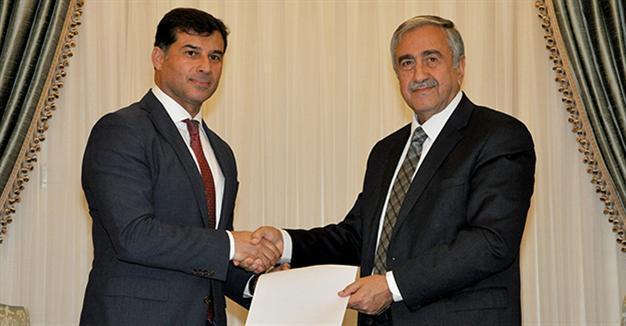New Turkish Cypriot PM ‘backs Cyprus peace talks’
NICOSIA – Anadolu Agency
 The new prime minister of the Turkish Cypriot community, Hüseyin Özgürgün, said May 4 that his government supported the United Nations-brokered peace talks with the Greek Cypriot community to find a peaceful solution to the over-forty-year conflict.
The new prime minister of the Turkish Cypriot community, Hüseyin Özgürgün, said May 4 that his government supported the United Nations-brokered peace talks with the Greek Cypriot community to find a peaceful solution to the over-forty-year conflict. “As the UBP [National Unity Party] government, we will not be in an open split of opinion with the President [Mustafa Akıncı] in finding a solution in Cyprus in every sense,” said Özgürgün.
Özgürgün started his duty as the new prime minister of Turkish Cyprus April 17, after Akıncı approved of the new coalition government cabinet in the wake of the last government’s collapse earlier last month.
The island has been divided into two communities since 1974, after Turkey partially intervened in the north after a coup aimed at unification with Greece took place.
Peace talks under the auspices of the U.N. were re-launched in May 2015, after Akıncı was elected as Turkish Cyprus’ new president.
“The obstacle before a solution has always been the Greek [Cyprus] side,” said Özgürgün, adding that as long as the already defined U.N. criteria for the equal representation of both of the sides will be implemented, his government would support the process.
“I see that an agreement is possible today if the Greek Cyprus side wants a solution as much as we do,” he added.
Akıncı and his Greek counterpart, Nicos Anastasiades, have been conducting intense peace talks since last May, with both sides having said a solution is possible within 2016.
But the process has slowed down in the past months due to elections on May 22 for the Greek Cypriot side.
“Turkey’s [position as an] effective and actual guarantor state is a must, and our red line,” Özgürgün said.
The UBP, which was the junior partner in the wide-based coalition with the Republican Turkish Party-United Forces (CTP-BG), withdrew from the government on April 2, citing the government’s poor economic policies.
















